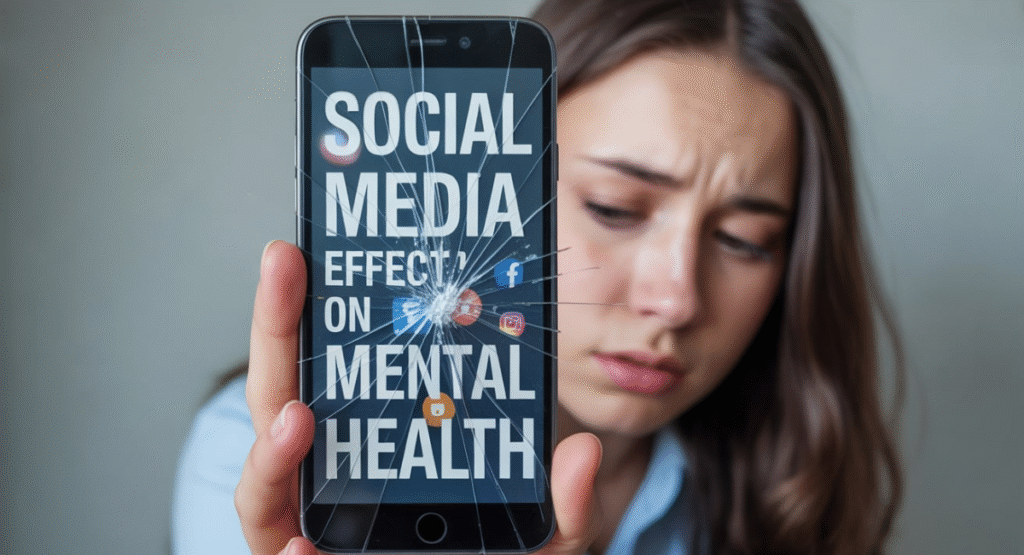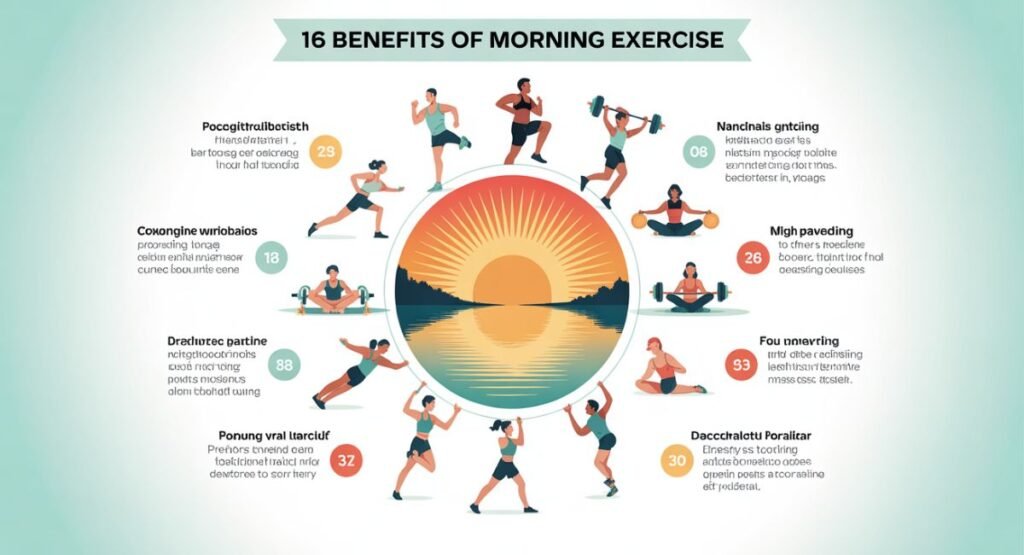Introduction
Social media is part of daily life for most Americans. People spend hours scrolling, liking, and sharing without realizing how it shapes their minds. The social media and mental health link is stronger than ever. While online networks help connect friends, they also create risks like social media addiction, social media anxiety, and unhealthy social media habits. This guide explores both the benefits and dangers, plus ways to stay mentally healthy in a connected world.
In today’s fast-paced digital world, social media and mental health have become deeply connected. Platforms like Facebook, Instagram, and TikTok shape how we think, feel, and interact. While online spaces can inspire and connect us, they can also harm emotional balance. The effects of social media on mental health range from boosting self-esteem through support networks to increasing anxiety from constant comparisons. People of all ages, especially teens, face challenges like social media addiction, cyberbullying, and sleep disruption. Understanding the impact of social media on self-esteem and emotional well-being is vital. This article explores both benefits and risks, offering practical tips to maintain a healthy digital life.
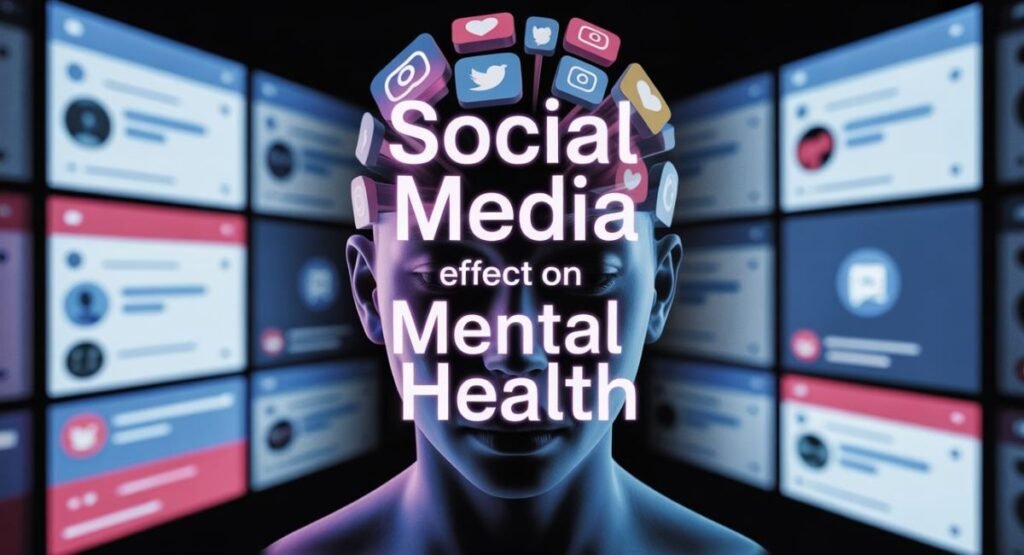
How Social Media Shapes Mental Health
The effects of social media on mental health are complex. Platforms give quick access to information, entertainment, and support. They also influence how people feel about themselves and others. Emotional highs come from likes and comments, but lows come from comparison or rejection. This mix impacts emotional well-being online every day.
Research shows that dopamine and social media are linked. Dopamine is the brain’s reward chemical. Notifications and messages trigger small dopamine releases, making people crave more online interaction. This constant stimulation can make offline life feel less exciting.
Positive Impacts of Social Media on Well-being
Social media offers strong benefits when used with purpose. Online support communities help people share experiences about mental health, recovery, and personal growth. They connect individuals with similar struggles and offer emotional comfort. These groups can be life-changing for those feeling alone.
Another positive impact of social media on self-esteem is awareness. Campaigns about body positivity, kindness, and mental health encourage people to seek help. For example, the #BellLetsTalk campaign in Canada raised millions for mental health support through online engagement.
Negative Consequences of Excessive Social Media Use
Too much screen time increases social media and loneliness, stress, and social isolation from technology. Comparing lives online can cause comparison culture online, where people feel their own life is less successful. This may lead to social media use and depression or low self-worth.
The effect of social media on self-esteem is another significant problem. People who scroll too much are frequently drawn into the comparison culture on the internet, where they evaluate their success and attractiveness against staged, filtered posts. As digital relationships take the place of real human interaction, this can lead to profound discontent, social media, and loneliness. Social media and academic distraction are becoming major issues for kids, impacting their focus and scores. Many people have social media and sleep issues as a result of late-night scrolling, which also affects sleep habits.
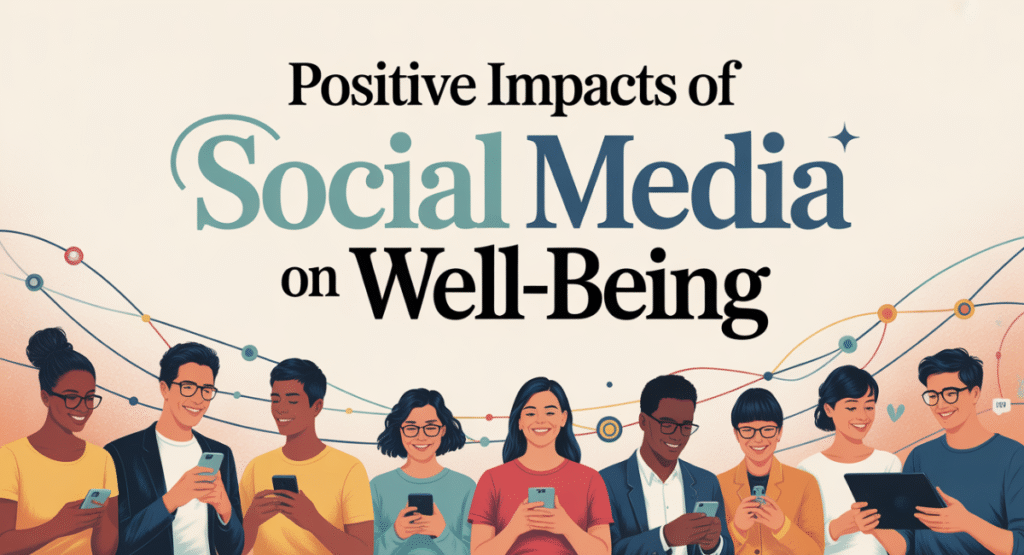
The Psychology Behind Social Media Addiction
Social media addiction works like gambling. The brain expects rewards, like likes or comments, and keeps checking for them. This is called a variable reward system, making it hard to stop.
Algorithms also play a role. Platforms design feeds to keep people engaged, which often leads to unhealthy social media habits. The more time spent, the higher the risk of mental fatigue and reduced real-world engagement.
Signs Your Mental Health Is Suffering from Social Media
Changes in mood after scrolling are common warning signs. Feeling anxious, restless, or sad after seeing posts may point to social media anxiety or comparison stress.
Other signs include neglecting hobbies, feeling fear of missing out (FOMO), or losing interest in offline events. Mental health and social media statistics show that heavy users are more likely to have mood disorders.
How Social Media Influences Sleep and Focus
Social media and sleep problems happen because blue light from screens disrupts the body’s sleep rhythm. Late-night scrolling delays rest, making mornings harder.
Focus also suffers. Social media and productivity loss are real. Constant alerts and messages interrupt deep work, leading to lower academic and job performance. This is often called social media and academic distraction in schools.
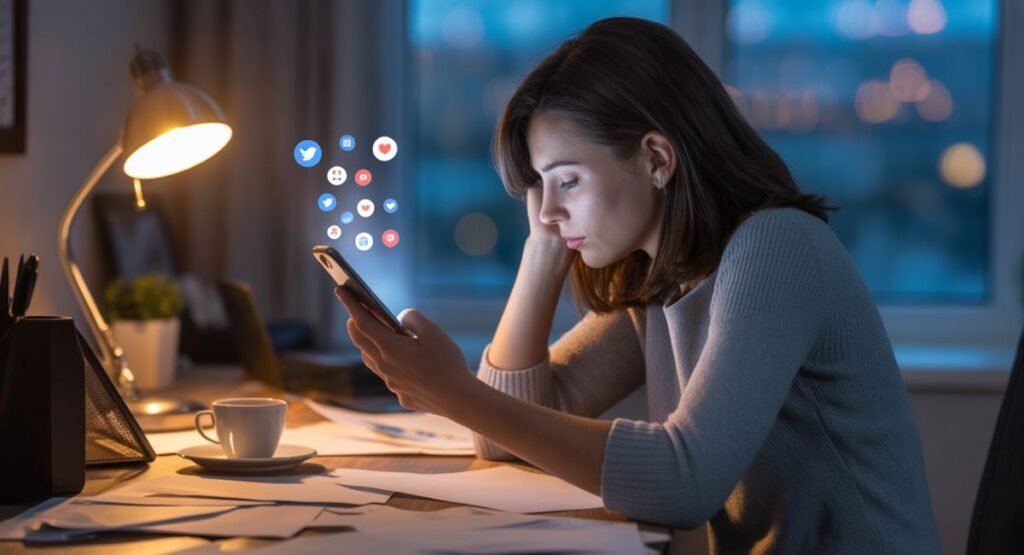
Setting Healthy Boundaries for Online Use
Creating social media boundaries helps protect mental health. This can mean setting time limits, turning off notifications, or keeping phones out of bedrooms.
Many people try managing notifications and alerts by only checking social media at set times. This reduces distractions and stress from constant pings.
Reducing Screen Time Without Feeling Disconnected
Some fear that reducing social media usage will make them lose friends. But focusing on face-to-face interaction benefits actually improves relationships.
Small changes like planning phone-free meetups, starting offline hobbies, and setting screen-free hours keep connection alive without relying on likes or comments.
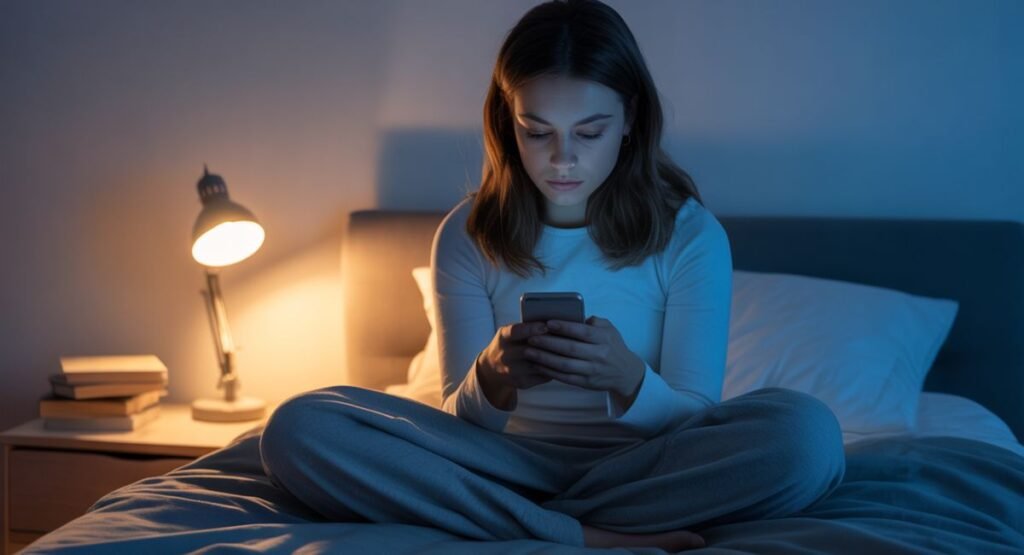
Offline Activities That Boost Mental Health
Nature walks, reading, art, or exercise are proven to help emotional well-being online by giving the mind rest from digital noise.
Table: Offline Activities and Mental Health Benefits
| Activity | Mental Health Benefit |
| Walking in nature | Reduces stress hormones |
| Reading a book | Improves focus and calm |
| Drawing/Art | Encourages creative thinking |
| Exercise | Boosts mood through endorphins |
Helping Teens Develop Healthy Social Media Habits
Social media and teenage mental health is a growing concern. Teens are more vulnerable to comparison culture online, body image issues, and the effects of Instagram on body image.
The role of parents in kids’ social media use is vital. Setting clear guidelines, talking openly, and modeling healthy social media habits help teens avoid harmful patterns.
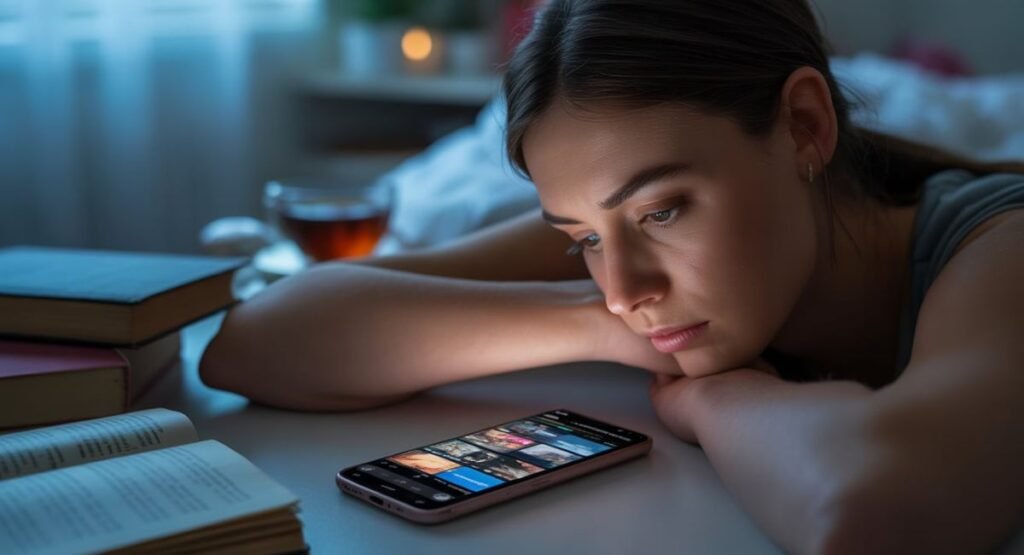
Supporting Friends Struggling with Online Overuse
Helping friends who overuse social platforms requires empathy. Listen without judgment, then suggest strategies to stop overusing social platforms, like taking breaks or joining offline groups.
Encouraging them to explore non-digital hobbies can slowly replace smartphone overuse and create space for real-life joy.
Mindfulness and Meditation for Digital Detox
Mindfulness for social media users means being aware of how and why they use platforms. Pausing before posting or scrolling can prevent emotional overload.
Digital detox techniques like meditation, deep breathing, or yoga help reset the mind. They also reduce social media and loneliness by shifting focus to present-moment living.
When to Seek Professional Help for Social Media-Related Stress
If online therapy for social media addiction or counseling feels necessary, it’s a sign the problem is serious. Ongoing anxiety, depression, or inability to reduce screen time may require expert care.
Professionals can teach coping strategies for unhealthy social media habits and help restore balance.
Future of Social Media and Mental Health Awareness
The future may see platforms adding tools to limit harmful use. Features like well-being reminders, time trackers, and improved social media privacy and safety can help reduce stress.
Public campaigns and school programs will likely focus more on mental health and social media statistics to encourage responsible usage. Balancing tech and life will become a global priority.
FAQs
What are the effects of social media on mental health?
It can boost connection but also cause anxiety, depression, and low self-esteem when overused.
What are 10 negative effects of social media?
Addiction, anxiety, depression, FOMO, cyberbullying, sleep issues, loneliness, distraction, poor body image, and reduced productivity.
How does social media affect Gen Z mental health?
Gen Z faces higher stress, comparison culture, and constant pressure to stay online, impacting emotional well-being.
How does social media affect teenagers?
It shapes identity and friendships but can also cause stress, body image issues, and academic distractions.
